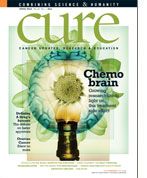Publication
Article
CURE
Hurdles on the Faster Track
Author(s):
Patients and the FDA battle over Avastin's breast cancer indication.
When the Food and Drug Administration decided in 2008 to accelerate approval of Avastin for treating advanced breast cancer, it understood that the anti-cancer drug would not necessarily prolong survival. Still, the regulatory agency concluded it might slow progression of the disease when taken with conventional chemotherapy agents.
After all, Avastin (bevacizumab) had been extensively tested through the agency’s traditional approval route, and it was already being widely prescribed for patients with colon and lung cancers. A few months earlier, the drug’s manufacturer had put forth a study that seemed to show Avastin provided some potential benefit for patients with incurable forms of breast cancer.
Indeed, that’s why 18 years ago the FDA—faced with the expanding HIV/AIDS epidemic—created the accelerated drug approval process. The goal was to significantly reduce the length of time it took to set up, implement and analyze the results of clinical trials so that patients diagnosed with life-threatening diseases and limited treatment options could get new drugs without having to wait for the traditional, time-consuming approval process to be carried out.
And in many ways the new process accomplished just that: It cut the time the FDA took for priority review of a drug application from 10 months to six between 1992 and 2004. The success with a range of new drugs for HIV/AIDS, for instance, has clearly lengthened survival and improved the lives of those diagnosed with the disease.
To???date, the FDA has approved more than 90 drugs to be processed faster, many of those for the treatment of cancer.
Following its priority review and accelerated protocols in 2010 alone,?the FDA approved many new uses of existing drugs, as well as new drugs for cancer patients, including Tykerb (lapatinib) for HER2-positive metastatic breast cancer, and Tasigna (nilotinib) and Sprycel (dasatinib) for patients with chronic myeloid leukemia (CML).
Already, about a third of the cancer drugs that have gone through the accelerated process are being made available to patients, not necessarily because they have been shown to extend life, but because they show a clinically meaningful outcome, such as delaying progression of the disease or improving symptoms. This measurement is known within the research and clinical community as a “surrogate endpoint” for determining whether a drug should be approved.
So when an FDA advisory panel recommended in July 2010 that the agency withdraw its accelerated approval of Avastin for metastatic HER2-negative breast cancer, thousands of women with the disease were, to put it mildly, disappointed. While the patients readily acknowledge that clinical trials showed Avastin may not prolong survival, some believe it can lengthen life for some patients and slow the progression of the disease in others.
Tumors release a protein called VEGF, or vascular endothelial growth factor, which signals the development of blood vessels to feed the tumor, a process known as angiogenesis. Avastin inhibits angiogenesis by binding to VEGF, slowing tumor growth in several types of cancer, most notably colon cancer.
Ellen Jurgens, a 64-year-old Roswell, Ga., woman who has battled triple-negative breast cancer for nearly four years, was one of about 10,000 patients and their families who asked the FDA to keep Avastin available to some patients—like herself—who have no other viable alternative. She has been taking the drug since March 2008 and credits it for keeping tumors in her lymph nodes, liver and bones in check during much of that time.
“I play golf. I travel. I babysit three grandkids. I dance. I live a normal, active life,” Jurgens says. “Even if it means I only live three months longer, that’s more time to see my grandkids grow up and be with them and with my family. That has to have some value, doesn’t it?”
Despite such pleas, the FDA agreed with the advisory committee’s recommendation in December to remove the breast cancer indication from the drug’s label. However, in February the FDA granted a first-of-its-kind public hearing in late June for Genentech, the drug’s manufacturer, to appeal the FDA’s decision.
The decision has no impact on Avastin’s use for colon, kidney, brain and lung cancers, which gained earlier approval through the conventional process.
But the effort to get Avastin approved for use in patients with breast cancer offers a glimpse into the promise and perils of fast-tracking drugs for patients with life-threatening diseases.
The preliminary evidence offered in 2007 indicated that when used in combination with Taxol (paclitaxel), Avastin delayed tumor progression an average of 5.5 months longer compared with conventional chemotherapy alone.
That finding wasn’t enough to persuade an earlier FDA advisory committee to recommend Avastin get accelerated approval for use in breast cancer patients with metastatic disease. The advisory committee voted 5-4 against—with several members expressing strong reservations about the potential risks of the drug.
But in a rare rejection of an advisory panel’s recommendation, the FDA said a five-month delay in progression could be a significant benefit and agreed in early 2008 to put the drug on the accelerated approval track. The agency told Genentech to continue providing data as more patients started taking the drug, a standard procedure for all drugs that go through this process.
Avastin’s accelerated approval prompted cancer treatment centers across the country to start making it available to patients with advanced breast cancer. Moreover, it opened the door for Medicare and most private insurers to start paying for use of the drug by breast cancer patients—no small consideration since Avastin costs, on average, about $88,000 per year. (Genentech has capped annual spending on the drug to $57,000 per year for patients with incomes below $100,000.)
“These women often live from scan to scan, and anything that seems to lengthen their time of disease-free progression has to be given strong consideration,” says Ruth O’Regan, MD, director of translational breast cancer research at Emory University’s Winship Cancer Institute in Atlanta. In recent years, Emory has made Avastin available to certain patients, including Jurgens, and followed them closely, O’Regan says.
For many taking the drug, the response was encouraging and their quality of life seemed to improve. The side effects the patients had been warned about were manageable, O’Regan says. That’s why she and other breast cancer experts were surprised when two follow-up trials by Avastin’s manufacturer failed to confirm the original results that led to the drug getting accelerated approval.
One of the studies showed the delay in tumor progression for patients was one to three months. In the other study, it was less than a month. Moreover, Avastin’s toxicity was more severe in the recent trials. Complications included high blood pressure, bleeding, perforations in the stomach and intestines, heart attack and heart failure. Together, these factors helped persuade the 2010 advisory panel to recommend by a vote of 12-1 that Avastin no longer be used for patients with advanced breast cancer. The agency affirmed that recommendation on Dec. 16 and notified Genentech it planned to withdraw marketing approval for use of the drug in breast cancer patients.
Wyndham Wilson, MD, PhD, who headed the 2010 advisory committee and directs the lymphoma therapeutics section of the National Cancer Institute, understands the frustrations of patients and advocates who still believe the drug holds promise for prolonging progression-free survival for some breast cancer patients. But that simply wasn’t the case in the follow-up studies with Avastin, he says.
“But we have to judge whether that is clinically meaningful from a patient’s point of view,” he says. “We didn’t have that data with Avastin.”
Future follow-up trials of similar drugs should include patient-reported quality-of-life indicators—like improvement in symptoms, better mental health and attitude while living with cancer—to help regulators understand how patients feel, even if the drug doesn’t have a significant impact on overall survival, he says.
Still, Wilson and others do not consider the experience with Avastin a failure of the accelerated approval process. “We do not look at this as a mistake,” said Richard Pazdur, MD, director of the FDA’s Office of Oncology Drug Products in a press release at the time of the committee’s vote. “There is a risk … in approving these drugs and this is a management of that risk.”
The FDA went through a similar process when it granted AstraZeneca accelerated approval for Iressa (gefitinib) in May 2003 because preliminary studies indicated adding the drug to conventional treatment increased overall survival and tumor shrinkage in patients with non-small cell lung cancer who had failed two or more courses of chemotherapy.
But by Dec. 17, 2004, AstraZeneca reported that a much larger clinical trial comparing patients who were taking the drug with those who were taking a placebo showed no survival benefit.The agency eventually decided that the drug should no longer be prescribed for non-small cell lung cancer patients, except in patients the drug previously benefited. Metastatic lung cancer patients had several other drugs as an alternative to Iressa, the agency said. Breast cancer patients aren’t as fortunate.
“For many of us, we have nothing else to fall back on,” says Jurgens, who wants the FDA to recommend that Avastin still be prescribed to triple-negative breast cancer patients. “That’s a small group—something like 15 percent of breast cancer patients. These patients should be able to decide with their doctors whether the drug has the benefit we seek.”
That compromise could happen as the debate continues at the late-June public hearing that the FDA has granted for Genentech.
While the experience with Avastin and Iressa captured headlines in recent years, the faster approval process has quietly led to other anti-cancer agents being made available to more patients.
One of those, Tykerb, was approved in combination with Femara (letrozole) to treat hormone-positive and HER2-positive, postmenopausal advanced breast cancer patients for whom hormonal therapy is indicated. In randomized trials, Tykerb was shown to more than double the length of time patients lived without cancer spreading, from three months to more than eight, compared to Femara alone.
Using the speedier process, two new treatment protocols were also made available in 2010 for patients with a rare blood cancer called Philadelphia chromosome—positive chronic phase chronic myeloid leukemia (PH+CP-CML).
In June, the agency approved a new indication for the drug Tasigna for newly diagnosed patients with this rare blood disorder after studies showed a greater percentage of patients experienced a reduction of cancer cells in those who received Tasigna compared to those who received Gleevec, a conventional anti-CML agent that had won approval from the FDA through the accelerated process in 2001. In October, the FDA approved a new indication for the anti-CML drug Sprycel for treatment of the same disorder in the same group of patients.
Len Lichtenfeld, MD, deputy chief medical officer of the American Cancer Society, understands how frustrating the process can be for patients with incurable cancers. He too would like to see the process factor quality-of-life measurements more heavily into confirmatory clinical trials.
“With cancer drugs we accept more side effects and a certain level of toxicity in hopes of achieving some improvement in survival,” he says. “If they offer a reasonable chance they can do that, we want to get them out to as many people as possible who can benefit from them.”
But the FDA can’t simply throw open the door to any drug that seems to work in a small number of patients. The measure of success will have to be constantly refined, he says. “The judicious use of the fast-track process is worthwhile and should continue.”





